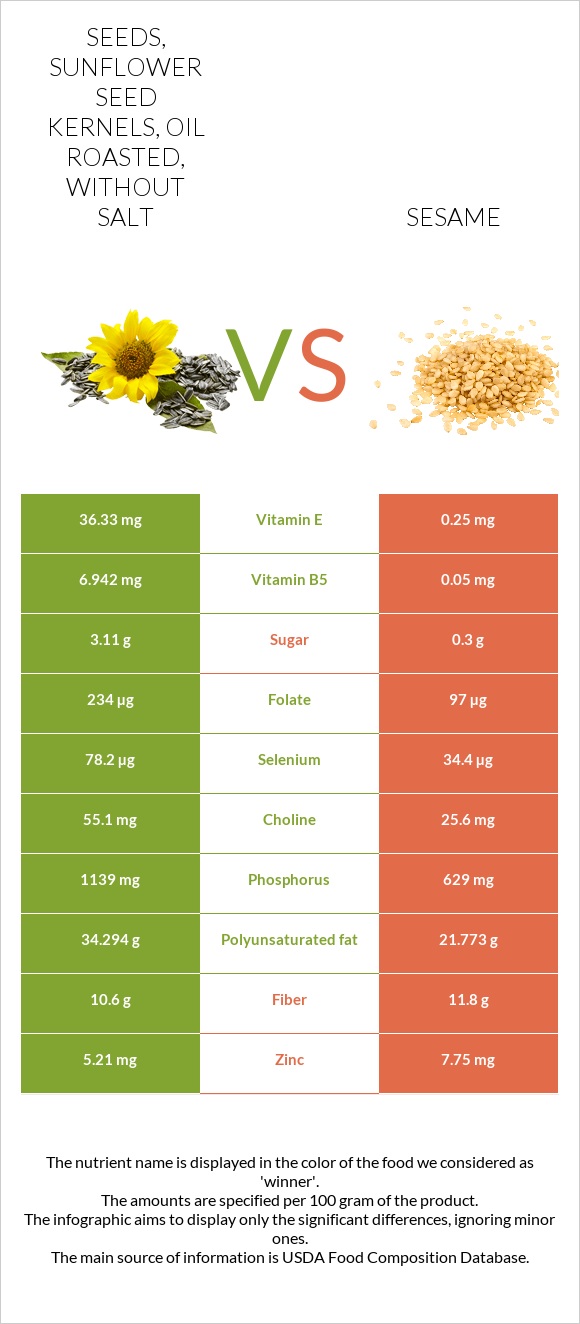Seeds, sunflower seed kernels, oil roasted, without salt vs. Sesame — In-Depth Nutrition Comparison
Compare
Differences between seeds, sunflower seed kernels, oil roasted, without salt and sesame
- Seeds, sunflower seed kernels, oil roasted, without salt has more vitamin E, vitamin B5, selenium, phosphorus, and folate, while sesame has more copper, iron, calcium, magnesium, and vitamin B1.
- Sesame's daily need coverage for copper is 253% higher.
- Sesame contains 145 times less vitamin E than seeds, sunflower seed kernels, oil roasted, without salt. Seeds, sunflower seed kernels, oil roasted, without salt contains 36.33mg of vitamin E, while sesame contains 0.25mg.
The food types used in this comparison are Seeds, sunflower seed kernels, oil roasted, without salt and Seeds, sesame seeds, whole, dried.
Infographic

Infographic link
Mineral Comparison
Mineral comparison score is based on the number of minerals by which one or the other food is richer. The "coverage" charts below show how much of the daily needs can be covered by 300 grams of the food.
| Contains more PhosphorusPhosphorus | +81.1% |
| Contains less SodiumSodium | -72.7% |
| Contains more SeleniumSelenium | +127.3% |
| Contains more MagnesiumMagnesium | +176.4% |
| Contains more CalciumCalcium | +1020.7% |
| Contains more IronIron | +240% |
| Contains more CopperCopper | +126.3% |
| Contains more ZincZinc | +48.8% |
| Contains more ManganeseManganese | +18.3% |
Vitamin Comparison
Vitamin comparison score is based on the number of vitamins by which one or the other food is richer. The "coverage" charts below show how much of the daily needs can be covered by 300 grams of the food.
| Contains more Vitamin CVitamin C | +∞% |
| Contains more Vitamin EVitamin E | +14432% |
| Contains more Vitamin B2Vitamin B2 | +13.4% |
| Contains more Vitamin B5Vitamin B5 | +13784% |
| Contains more Vitamin KVitamin K | +∞% |
| Contains more FolateFolate | +141.2% |
| Contains more Vitamin B1Vitamin B1 | +147.2% |
All nutrients comparison - raw data values
| Nutrient |  |
 |
DV% diff. |
| Copper | 1.804mg | 4.082mg | 253% |
| Vitamin E | 36.33mg | 0.25mg | 241% |
| Vitamin B5 | 6.942mg | 0.05mg | 138% |
| Iron | 4.28mg | 14.55mg | 128% |
| Calcium | 87mg | 975mg | 89% |
| Polyunsaturated fat | 34.294g | 21.773g | 83% |
| Selenium | 78.2µg | 34.4µg | 80% |
| Phosphorus | 1139mg | 629mg | 73% |
| Magnesium | 127mg | 351mg | 53% |
| Vitamin B1 | 0.32mg | 0.791mg | 39% |
| Folate | 234µg | 97µg | 34% |
| Monounsaturated fat | 8.063g | 18.759g | 27% |
| Zinc | 5.21mg | 7.75mg | 23% |
| Manganese | 2.08mg | 2.46mg | 17% |
| Protein | 20.06g | 17.73g | 5% |
| Fiber | 10.6g | 11.8g | 5% |
| Choline | 55.1mg | 25.6mg | 5% |
| Fats | 51.3g | 49.67g | 3% |
| Vitamin B2 | 0.28mg | 0.247mg | 3% |
| Vitamin K | 3.1µg | 0µg | 3% |
| Vitamin B3 | 4.13mg | 4.515mg | 2% |
| Calories | 592kcal | 573kcal | 1% |
| Vitamin C | 1.1mg | 0mg | 1% |
| Saturated fat | 7.068g | 6.957g | 1% |
| Net carbs | 12.29g | 11.65g | N/A |
| Carbs | 22.89g | 23.45g | 0% |
| Potassium | 483mg | 468mg | 0% |
| Sugar | 3.11g | 0.3g | N/A |
| Sodium | 3mg | 11mg | 0% |
| Vitamin B6 | 0.792mg | 0.79mg | 0% |
| Trans fat | 0.158g | N/A | |
| Tryptophan | 0.306mg | 0.388mg | 0% |
| Threonine | 0.817mg | 0.736mg | 0% |
| Isoleucine | 1.003mg | 0.763mg | 0% |
| Leucine | 1.461mg | 1.358mg | 0% |
| Lysine | 0.825mg | 0.569mg | 0% |
| Methionine | 0.435mg | 0.586mg | 0% |
| Phenylalanine | 1.029mg | 0.94mg | 0% |
| Valine | 1.158mg | 0.99mg | 0% |
| Histidine | 0.556mg | 0.522mg | 0% |
| Omega-3 - ALA | 0.076g | N/A | |
| Omega-6 - Gamma-linoleic acid | 0.006g | N/A | |
| Omega-6 - Eicosadienoic acid | 0.005g | N/A | |
| Omega-6 - Linoleic acid | 34.124g | N/A |
Macronutrient Comparison
Macronutrient breakdown side-by-side comparison
Protein:
20.06 g
Fats:
51.3 g
Carbs:
22.89 g
Water:
1.54 g
Other:
4.21 g
Protein:
17.73 g
Fats:
49.67 g
Carbs:
23.45 g
Water:
4.69 g
Other:
4.46 g
| Contains more ProteinProtein | +13.1% |
| Contains more WaterWater | +204.5% |
~equal in
Fats
~49.67g
~equal in
Carbs
~23.45g
~equal in
Other
~4.46g
Fat Type Comparison
Fat type breakdown side-by-side comparison
Saturated fat:
Sat. Fat
7.068 g
Monounsaturated fat:
Mono. Fat
8.063 g
Polyunsaturated fat:
Poly. Fat
34.294 g
Saturated fat:
Sat. Fat
6.957 g
Monounsaturated fat:
Mono. Fat
18.759 g
Polyunsaturated fat:
Poly. Fat
21.773 g
| Contains more Poly. FatPolyunsaturated fat | +57.5% |
| Contains more Mono. FatMonounsaturated fat | +132.7% |
~equal in
Saturated fat
~6.957g